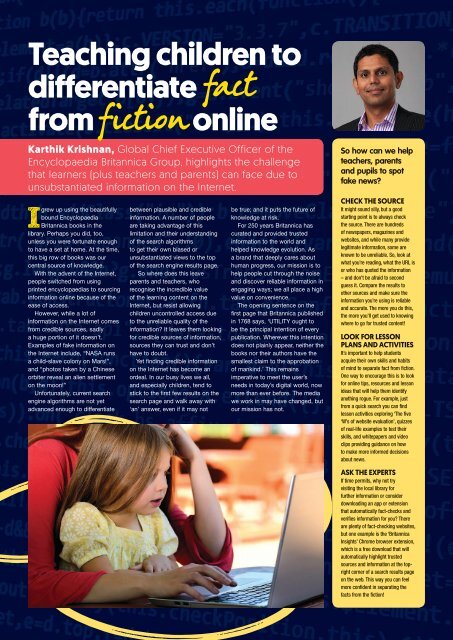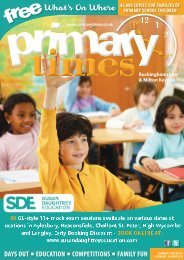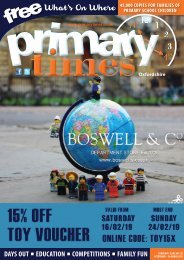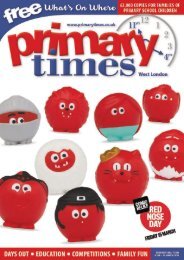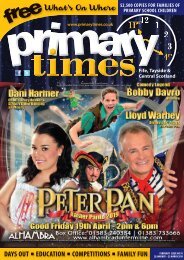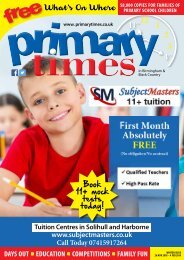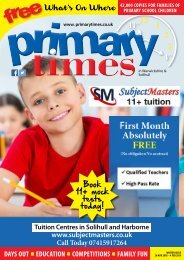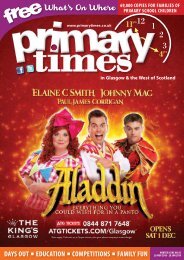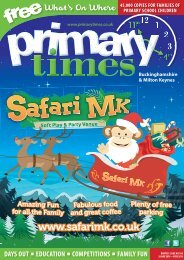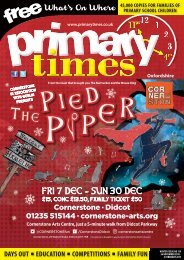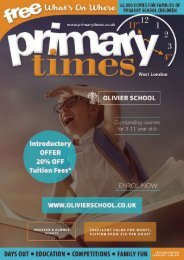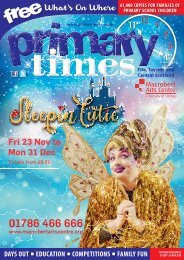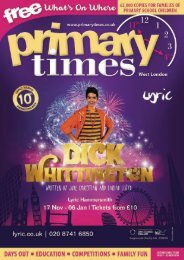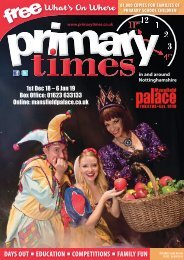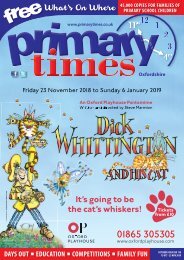PTNotts_BackToSchool18
You also want an ePaper? Increase the reach of your titles
YUMPU automatically turns print PDFs into web optimized ePapers that Google loves.
Teaching children to<br />
differentiate fact<br />
from fiction online<br />
Karthik Krishnan, Global Chief Executive Officer of the<br />
Encyclopaedia Britannica Group, highlights the challenge<br />
that learners (plus teachers and parents) can face due to<br />
unsubstantiated information on the Internet.<br />
Igrew up using the beautifully<br />
bound Encyclopaedia<br />
Britannica books in the<br />
library. Perhaps you did, too,<br />
unless you were fortunate enough<br />
to have aset at home. At the time,<br />
this big row ofbooks was our<br />
central source of knowledge.<br />
With the advent of the Internet,<br />
people switched from using<br />
printed encyclopaedias to sourcing<br />
information online because of the<br />
ease of access.<br />
However, while alot of<br />
information on the Internet comes<br />
from credible sources, sadly<br />
ahuge portion of it doesn’t.<br />
Examples of fake information on<br />
the Internet include, “NASA runs<br />
achild-slave colony on Mars!”,<br />
and “photos taken by aChinese<br />
orbiter reveal an alien settlement<br />
on the moon!”<br />
Unfortunately, current search<br />
engine algorithms are not yet<br />
advanced enough to differentiate<br />
between plausible and credible<br />
information. Anumber of people<br />
are taking advantage of this<br />
limitation and their understanding<br />
of the search algorithms<br />
to get their own biased or<br />
unsubstantiated views to the top<br />
of the search engine results page.<br />
So where does this leave<br />
parents and teachers, who<br />
recognise the incredible value<br />
of the learning content on the<br />
Internet, but resist allowing<br />
children uncontrolled access due<br />
to the unreliable quality of the<br />
information? It leaves them looking<br />
for credible sources of information,<br />
sources they can trust and don’t<br />
have to doubt.<br />
Yetfinding credible information<br />
on the Internet has become an<br />
ordeal. In our busy lives we all,<br />
and especially children, tend to<br />
stick to the first few results on the<br />
search page and walk away with<br />
‘an’ answer, even if it may not<br />
be true; and it puts the future of<br />
knowledge at risk.<br />
For 250 years Britannica has<br />
curated and provided trusted<br />
information to the world and<br />
helped knowledge evolution. As<br />
abrand that deeply cares about<br />
human progress, our mission is to<br />
help people cut through the noise<br />
and discover reliable information in<br />
engaging ways; we all place ahigh<br />
value on convenience.<br />
The opening sentence on the<br />
first page that Britannica published<br />
in 1768 says, ‘UTILITY ought to<br />
be the principal intention of every<br />
publication. Wherever this intention<br />
does not plainly appear, neither the<br />
books nor their authors have the<br />
smallest claim to the approbation<br />
of mankind.’ This remains<br />
imperative to meet the user’s<br />
needs in today’s digital world, now<br />
more than ever before. The media<br />
we work in may have changed, but<br />
our mission has not.<br />
So how can we help<br />
teachers, parents<br />
and pupils to spot<br />
fake news?<br />
CHECK THE SOURCE<br />
It might sound silly,but agood<br />
starting point is to always check<br />
the source.Thereare hundreds<br />
of newspapers, magazines and<br />
websites, and while many provide<br />
legitimate information, some are<br />
known to be unreliable.So, look at<br />
what you’re reading,what the URL is<br />
or who has quoted the information<br />
–and don’t be afraid to second<br />
guess it. Comparethe results to<br />
other sources and makesurethe<br />
information you’re using is reliable<br />
and accurate.The moreyou do this,<br />
the moreyou’ll get used to knowing<br />
wheretogofor trusted content!<br />
LOOK FORLESSON<br />
PLANS AND ACTIVITIES<br />
It’simportant to help students<br />
acquiretheir ownskills and habits<br />
of mind to separate fact from fiction.<br />
One waytoencourage this is to look<br />
for online tips, resources and lesson<br />
ideas that will help them identify<br />
anything rogue.For example,just<br />
from aquicksearch you can find<br />
lesson activities exploring ‘The five<br />
‘W’sofwebsite evaluation’, quizzes<br />
of real-life examples to test their<br />
skills, and whitepapers and video<br />
clips providing guidance on how<br />
to makemoreinformed decisions<br />
about news.<br />
ASK THE EXPERTS<br />
If time permits, whynot try<br />
visiting the local libraryfor<br />
further information or consider<br />
downloading an app or extension<br />
that automatically fact-checks and<br />
verifies information for you? There<br />
areplenty of fact-checking websites,<br />
but one example is the ‘Britannica<br />
Insights’ Chrome browser extension,<br />
whichisafreedownload that will<br />
automatically highlight trusted<br />
sources and information at the topright<br />
corner of asearch results page<br />
on the web.This wayyou can feel<br />
moreconfident in separating the<br />
facts from the fiction!


